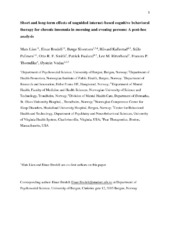Short and long-term effects of unguided internet-based cognitive behavioral therapy for chronic insomnia in morning and evening persons: a post-hoc analysis
Lien, Mats; Bredeli, Einar Rørstad; Sivertsen, Børge; Kallestad, Håvard; Pallesen, Ståle; Smith, Otto Robert Frans; Faaland, Patrick; Ritterband, Lee M.; Thorndike, Frances P.; Vedaa, Øystein
Peer reviewed, Journal article
Accepted version
Permanent lenke
https://hdl.handle.net/1956/22087Utgivelsesdato
2019Metadata
Vis full innførselSamlinger
Originalversjon
https://doi.org/10.1080/07420528.2019.1647435Sammendrag
A post-hoc analysis comparing morning and evening persons with insomnia on sleep and mental health characteristics was conducted in order to investigate whether an Internet-based cognitive behavioral therapy for insomnia (ICBTi) was effective both for morning and evening persons. Adult patients (N = 178, mean age = 44.8, 67% females) with insomnia were randomized to either ICBTi (N = 92; morning persons = 41; evening persons = 51) or a web-based patient education condition (N = 86; morning persons = 44; evening persons = 42). All patients were assessed with sleep diaries, the Insomnia Severity Index (ISI), the Bergen Insomnia Scale (BIS), the Dysfunctional Beliefs and Attitudes about Sleep Scale (DBAS-16), the Hospital Anxiety and Depression Scale (HADS) and the Chalder Fatigue Scale (CFQ). Patients were characterized as morning or evening persons based on a median split on the Horne-Östberg Morningness Eveningness Questionnaire. Short and long-term effects of treatment were examined with mixed-model repeated-measures analyses. Morning and evening persons did not differ in terms of age, gender or educational status. At baseline, morning persons had more wake time after sleep onset (d= 0.54, p < .001) and more early morning awakening (d= 0.38, p < .05) compared to evening persons, while evening persons reported longer sleep onset latency (d= 0.60, p < .001), more time in bed (d= 0.56, p < .001), longer total sleep time (d= 0.45, p < .01), more fatigue (d= 0.31, p < .05) and more dysfunctional beliefs and attitudes about sleep (d= 0.47, p < .01). Despite these differences at baseline, both morning and evening persons receiving ICBTi benefitted more across most measures compared to morning and evening persons who received patient education. For morning persons in the ICBTi group, ISI scores were reduced from 17.3 at baseline to 8.8 (dpre-post = 2.48, p < .001) at post-assessment, and to 10.0 at 18-month follow up (dpre-post18m = 2.13, p < .001). Comparable results were found for evening persons in the ICBTi group, with a reduction in ISI scores from 17.4 at baseline to 8.6 (dpre-post = 2.24, p < .001) at post-assessment, and to 8.7 at 18-month follow up (dpre-post18m = 2.19, p < .001). Similar results were found on the BIS, DBAS, HADS, CFQ and sleep diary data. Despite different insomnia symptomatology between the two groups, the current study suggests that ICBTi is effective across scores on the morningness-eveningness dimension. The study was pre-registered at: ClinicalTrials.gov Identifier: NCT02261272.
